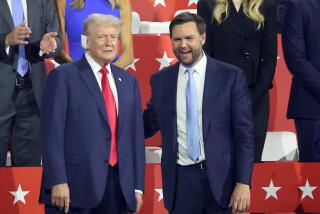Clinton Continues Verbal Scuffle With NRA Over Gun Violence
CLEVELAND — The rhetorical war between the National Rifle Assn. and the White House escalated Monday as President Clinton charged that the NRA callously tolerates the toll of gun violence and opposes even the slightest effort to make the nation safer.
The latest controversy over gun control overshadowed what is one of Clinton’s fondest policy issues: health care. Here for a policy speech advocating a prescription drug benefit for 39 million Medicare beneficiaries, Clinton found himself answering an NRA official’s charge that he is “willing to accept a certain level of killing to further his political agenda.”
For the record:
12:00 a.m. March 30, 2000 For the Record
Los Angeles Times Thursday March 30, 2000 Home Edition Part A Page 3 Metro Desk 1 inches; 30 words Type of Material: Correction
Gun purchases--The Times incorrectly reported in a March 14 article that the National Rifle Assn. opposes background checks for buyers at gun shows. In fact, the NRA favors checks if they can be done within 24 hours.
“He could say that on television,” Clinton told a group of retirees. “I’d like to see him look into the eyes of little Kayla Rolland’s mother and say that.” Kayla is the first-grader who was shot and killed by a classmate two weeks ago in Michigan. Last week, Clinton met with Kayla’s mother at the White House.
The NRA’s latest blast against Clinton, beginning with television ads last week that all but called him a liar on gun control, hit a high pitch Sunday. Wayne LaPierre, the organization’s executive vice president, said on ABC-TV’s “This Week” that Clinton and Vice President Al Gore have been exploiting gun deaths for political purposes.
Said LaPierre: “The pollsters and consultants are telling them: ‘Scare suburban women on this issue.’ ”
In a speech to a group of Democratic contributors, Clinton suggested that the NRA has no understanding of social responsibility.
“They’re not for anything that is a preventive measure that might require the slightest effort on the part of the people they represent, even if making that effort lets everyone else live in a safer America,” Clinton said.
The controversy has also spilled into the presidential campaign. Gore demanded an apology from LaPierre. In an interview with Associate Press, LaPierre called the administration’s lack of enforcement of gun laws “shameful” and political.
“If it’s not for a political agenda, they need to say something to the NRA or the American people that makes sense,” LaPierre said.
The NRA has produced 13 television ads harshly condemning Clinton and promoting gun owners’ rights. All of the ads feature Hollywood actor and longtime NRA spokesman Charlton Heston, who accuses Clinton of insulting gun owners and not enforcing existing gun laws.
“Mr. Clinton, you said the reason other countries have lower gun death rates is because they don’t have an NRA. . . . With that sweeping slur, you blamed on lawful gun owners the savage acts of murderers,” Heston says in one.
The president has called on the states to require all gun owners to be licensed and pass a basic safety course. But the bill he is trying to move in Congress is nowhere near as far-reaching. That measure would require child safety locks on new guns, ban the importation of high-capacity ammunition clips and require background checks for buyers at weekend gun shows.
The Senate passed the gun control measures last year, but congressional negotiators have not met since August to resolve differences with a House-passed bill. The NRA strongly opposes background checks for buyers at gun shows, contending that the requirements would drive the weekend events out of business. The organization says that it is Clinton’s unwillingness to compromise that has kept gun safety measures from advancing.
On the Medicare issue, Clinton tried to head off GOP proposals to provide a limited prescription benefit for low-income retirees or to provide the assistance by tax credit for the purchase of private insurance.
When Medicare was created in 1965, penicillin was still viewed as a wonder drug. Drugs were relatively inexpensive and could do far less than modern medicines. As a result, Medicare pays for hospitalizations but not for prescriptions that could keep someone out of the hospital. Most retirees rely on private insurance to cover gaps in Medicare, but they complain of its cost and limits.
A benefit for the poor would not reach many middle-class retirees who spend a disproportionate share of their limited budgets on prescriptions, Clinton argued. According to a new White House analysis, middle-income retirees who lack private prescription coverage appear to be denying themselves medicines to save money. The study found that middle-income retirees without private coverage spend 75% more on prescriptions but use 20% fewer medicines than those with similar incomes who have supplemental insurance.
As for the Republican-proposed tax credit, Clinton said that it would be of little use to those who do not earn enough to be liable for any income taxes.
Clinton and congressional Democrats favor granting Medicare beneficiaries the option of buying prescription coverage through the program for an initial premium of $24 a month. The subsidized government benefit would be much more affordable than the average premium for private insurance, which is $164 at age 65 and rises to $217 by age 80.
“This is not a partisan issue,” said Clinton. “Look, they can name this prescription drug program after Herbert Hoover, Calvin Coolidge and Warren Harding. . . . I don’t care. Just do it.”
Times staff writer Janet Wilson in Los Angeles contributed to this story.
More to Read
Get the L.A. Times Politics newsletter
Deeply reported insights into legislation, politics and policy from Sacramento, Washington and beyond. In your inbox three times per week.
You may occasionally receive promotional content from the Los Angeles Times.










